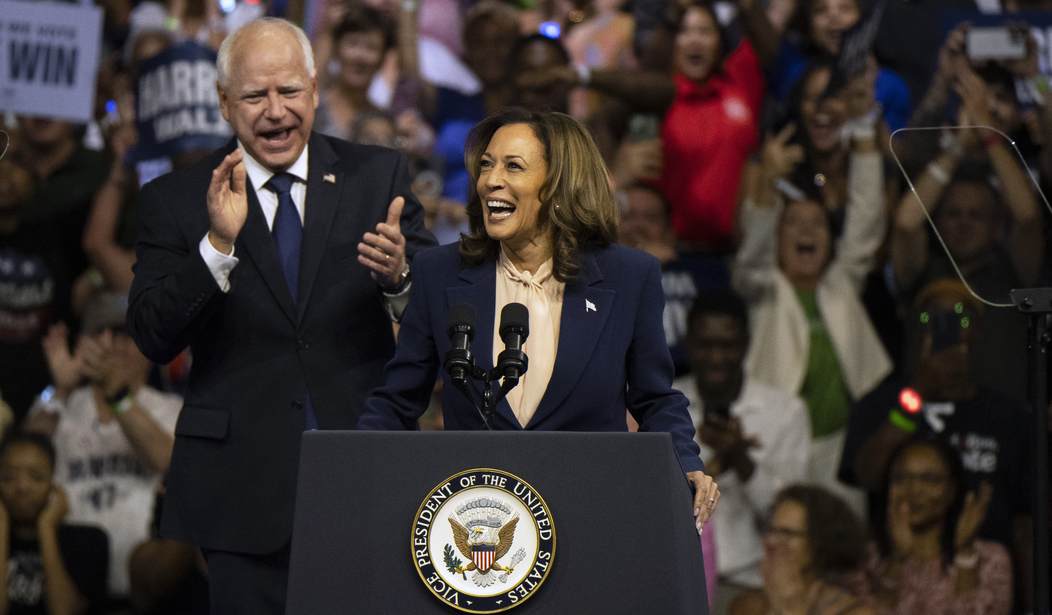Kamala Harris has a political problem bound up in an economic problem. Harris, the sitting vice president (and Democratic nominee), must convince Americans that the Biden–Harris administration’s stormy record of inflation and malaise will break into sunny prosperity should Harris ascend to the White House. To do so, she has fixated on high prices — the subject of an address she will deliver on Friday. This consumers should applaud. However, her diagnosis of inflation’s root causes, and her proposed remedies, should cut that applause short.
Harris has misidentified the disease of which inflation is a symptom. She blames corporate greed as the driver of rising prices — not profligate stimulus; not incontinent monetary policy; not the supply-side chaos caused by Covid-19 and the attendant state-imposed lockdowns; not price-ballooning central planning, such as protectionism and barriers to energy abundance; not anti-innovative boondoggles, such as the Farm Bill.
The strings connecting high food prices to corporate greed are wild-eyed and largely fictious, economists Ryan Bourne and Bryan Cutsinger write. According to NYU data, the grocery industry average a net profit margin of just 1.18 percent. Bourne and Cutsinger note that policies that attempt to tie inflation to corporate greed “are not only economically destructive, but would have failed to address inflation’s underlying cause — namely, a surge in total spending brought on by excessive monetary and fiscal stimulus.”
Harris’s policy prescriptions are predictably inapt — or worse. Her campaign says that she will seek to impose price controls on food and groceries and dispatch antitrust officials to harass grocery stores that attempt mergers. These kinds of policies — which, under Biden, have proven useless — have attracted economically muddled politicians for time immemorial. Ham-fisted flailing at “corporate greed” is the last refuge of politicians who want desperately to seem to have command of economic issues about which they are wholly baffled. The twin barrels of anti-corporate populism — price fixing and frivolous antitrust — unfailingly worsen the bad economic conditions that cultivate populism in the first place.
Recommended
Price controls have performed abysmally whenever implemented, irrespective of the political persuasion of their advocates. Neither Rome nor Soviet Russia, Franklin Roosevelt nor Richard Nixon, succeeded with them. They both shrink supply and spur demand, simultaneously lessening incentives to produce (i.e., lowering profits to be gained from marketing the controlled good) and discouraging sensible consumer restraint.
Despite the trouble and inconvenience they cause, high prices perform an economically crucial task. If the price of beef rises by $5 dollars per pound to reflect a supply constraint, consumers will likely consume less beef. Some may buy one pound instead of two; some may cook with chicken instead. This market-arranged rationing prevents the overbuying and the consequent shortages that price controls commonly trigger. Moreover, the chance to make higher-than-ordinary profits entices producers to market more beef, increasing supply and easing prices. Fighting inflation with price controls resembles fighting fire with lighter fluid.
Judging by recent experience, Harris’s antitrust proposals would perform little better. Led by a Biden appointee, the Federal Trade Commission has sued to block the merger of Albertson’s and Kroger — despite the deal’s likely pro-competitive and pro-consumer effects. The intellectual castle from which Biden’s antitrusters have sallied forth (and their only available intellectual refuge) is the assumption that corporate bigness is innately bad. This fragile position stands on unfirm economic ground, sustained by neither hard economic analysis nor historical experience.
As economist Milton Friedman described the strategy of wage and price controls as “a device that governments have repeatedly resorted to try to cover up the effects of their own policies." Thus, Harris ignores the current administration’s economic bungling and attempts instead to scapegoat industry. Indeed, The New York Times reports “an aggressive rhetorical attempt to shift the blame for high inflation onto corporate America” to be “centerpiece of her plans.” Particularly, given the slight chances that price controls could pass Congress, perhaps Harris’s new announcements should be understood as an electioneering tactic rather than an economic plan.
Economic populists of all political persuasions have a Mary Poppins–style purse, filled with an unending supply of stories to demonize large businesses, whatever economic conditions happen to materialize. Corporations that raise prices are called gougers. Corporations that cut prices are vilified as anticompetitively undercutting their competition. When profits rise, corporations find themselves accused of greed. When they endure losses, nobody says a word.
Deploying regulation as a political weapon rather than an economic tool can serve only harm American consumers. However, as politicians have found for centuries, it might just catch a few extra votes.
David B. McGarry is a policy analyst at the Taxpayers Protection Alliance.

























Join the conversation as a VIP Member